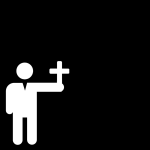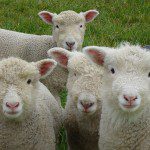GODSTUFF
PASSING OVER THE NARROW PLACES (AND PASS THE MATZO, TOO)
Somehow, instinctively perhaps, this year I sensed it was time for Passover before I checked the calendar. The most significant clue was that I had almost run out of matzo.
The two Manischiewitz boxes I bought the week after Passover last year were nearly empty, and what remained was on the far side of stale. In 2007, I spent all of Passover with Rabbi Allen Secher, his wife, Ina, and their schnauzer named Farfel, driving across the state of Montana on a circuit-riding-rabbi tour.
Secher, who in 1991 founded Chicago’s Makom Shalom, a Jewish Renewal congregation that meets at Epiphany United Church of Christ on the North Side, retired to Montana a while back to golf and fly fish. Until last year, he was the only resident rabbi in Montana. (A Lubavitch Chabad rabbi has since moved to town.)
So Secher has spent a good deal of his alleged “retired” time driving all over Montana — population 900,000, with a tiny Jewish community of about 1,100 — celebrating Shabbat, bar and bat mitzvahs, High Holy Days and, as was the case last year, a series of Passover seders from Bozeman to Kalispell.
I learned a lot about a lot of things on my Pesach odyssey with the Sechers, including a new appreciation for matzo. While the Sechers aren’t Orthodox by any stretch of the imagination, they do keep a number of spiritual disciplines during Passover, including the great sacrifice (they’re consummate foodies) of eating matzo — lots and lots of matzo — at every meal in place of any kind of leavened bread.
One morning, before the third seder of the week, I found Ina in the kitchen of their home in Whitefish, setting out oat milk for my coffee and taking a frying pan out of the cupboard.
“Have you ever had matzo brei?” she asked.
I shook my head no.
“Sit,” she said, and proceeded to chop up an onion, beat a couple of eggs and crumble several sheets of matzo into a bowl with a little water to soften them. Then, she fried the whole concoction and served it with blackberry jam.
Who knew? It was marvelous. When I returned to Chicago a few days after Passover was over, I went to the Jewel and bought the two packages of matzo — one egg-and-onion and one everything — and occasionally, when I’m particularly missing the rabbi, his missus, their dog and all things Montanan, I make matzo brei.
This year, there were no seders for me. I’ve been traveling, and there were a couple of deaths of friends and family, and I wasn’t invited to any Passover celebrations, which, considering that I’m not Jewish, was no great surprise.
Still, I felt that familiar pang of what I’ve heard described by other non-Jews as “seder envy.” Which is how I found myself on the Jewish Television Network Web site earlier this week, watching Passover-related videos and playing an online game of Ultimate Matzah Ball. (You have to toss a matzo ball through a moving basketball hoop, and if you miss, the computer taunts you by saying things such as, “Oy, my bubbe could do better.” It’s totally addictive.)
I also wandered into the food section and perused Passover recipes for a while before one advertising something you could do with leftover matzo caught my attention: Vegetarian Matzo Lasagna.
Now, I’m Italian. And my mother (even though she’s Irish) makes the best lasagna in the world. Really. (My dad helps.) I was skeptical that unleavened bread and sauteed squash could amount to anything remotely appetizing but decided, after watching Chef Jeff Nathan cook his matzo lasagna on the Jewish TV Network site, to give it a go.
The result was . . . absolutely scrumptious. Really. You have to use good marinara and decent cheeses, but it was outstanding, and matzo may henceforth usurp gummy-wide ribbon pasta in my lasagnas.
While the matzo lasagna was baking Thursday morning, I had a chance to think about some of the other things Rabbi Secher had taught me last Passover. The most-enduring lesson was his admonishment not to just think of Passover as the retelling of a 3,000-year-old story about the Israelites moving from slavery to freedom.
Passover commemorates God’s delivering the Jewish people out of slavery in Egypt or Mitzrayim, in the Hebrew, meaning “narrow place.” We all have narrow places in our own lives where fear, shame, insecurities and injuries keep us enslaved.
“Where are the narrow places in your life that you need to pass out of, that you need to be delivered from?” the rabbi asked me last year.
I named them, in my heart, and while I’m still wandering in the wilderness in some places, I can see a clearing up ahead in others. And miraculously, in a few areas, the seas even parted.
Today, we may be slaves. Next year, we shall be free.
The recipe for matzo lasagna and the Ultimate Matzah Ball game can be found at www.jewishtvnetwork.com.














